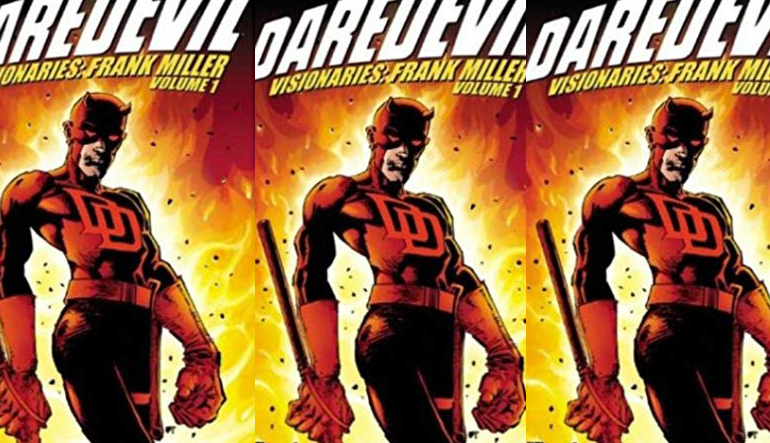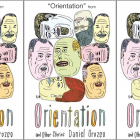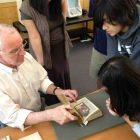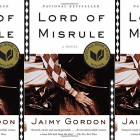In Response: Five Books That Changed Me

A few weeks back, Eric Weinstein had a great post about the five books that changed the way he wrote. His post inspired me to think about my own influences. I realized that, though I am a short story writer, some of the most important influences on my writing were not short stories. Also, for truly important works, I remember not only the words, but also the moment in time that they struck me. Timing was important to me. The below works hit me at the right time, when I was either looking for or was susceptible to great change.
So here are the five works that influenced my writing the most (and when I read them):
- 1986 – Frank Miller’s Daredevil. I read a lot of comic books when I was a kid. I knew at time that this was a very poor decision in terms of my social standing in elementary school. However, I couldn’t help it. I liked them. One day when I was eleven, amidst all the tales of muscle-bound superheroes saving the world from evil geniuses, I discovered Daredevil. At the time, it was written by a guy I had not heard of named Frank Miller. I followed the storyline of a blind hero whose only power was that his other senses were greatly heightened. I thought this would be a comic book about a good man triumphing over both his shortcomings and evil villains. It wasn’t. His girlfriend became a porn actress addicted to heroin. He lost several fights in very violent and bloody fashion. He had his reputation, career and home totally destroyed by evil men. (Note: I shouldn’t have been reading this at eleven). To my shock, all of this made him a better man. By the end of the story arc, after months of reading about violence, poverty and sex in New York’s Hell’s Kitchen, I believed I had been given a brutal look into the human condition. And I loved it. I did not know a story about another person’s pain could be so exhilarating. I wanted to do what Frank Miller did. I was convinced that I would someday write comic books.
- 1992 – James Joyce, The Dead. By high school, I had given up comic books, mainly because of the way girls looked at boys who read comic books. I was not yet really into literature. I liked to read, but I wasn’t one of those kids who wrote poetry and joined the school literary journal. Then, I was assigned The Dead in senior year English class. I hated the first few pages, and found most of the middle to be quite annoying. Who cares about these strange people who sing at a dinner party? I skipped to the end. I figured I could get the gist of it that way and fake my way to a public school A- on the book report. That’s when I hit the famous last sentence: His soul swooned slowly as he heard the snow falling faintly through the universe and faintly falling, like the descent of their last end, upon all the living and the dead. I discovered that words could be beautiful.
- 1995 – Flannery O’Connor Revelation. By my junior year of college, I was, in my own mind, a great writer. I was writing about marijuana, alcohol, sex, and radical politics. In other words, I was writing about the same things that every college kid writes about. And like every other college kid, I thought I was being profound. All of this was new to me, but I lacked the maturity to understand that none of this was new or interesting to anyone over the age of 24. It was about this time that I discovered Flannery O’Connor. I still remember reading Revelation for the first time. I was in a Physics lecture, and reading with my book in my lap. I was stunned by a divine moment entering the life of an otherwise unremarkable woman. I realized that my writing was lacking what Flannery O’Connor put into every one of her stories, moments of true poignancy happening to ordinary people. After reading that one story, I wanted to put Flannery O’Connor-like moments into my stories.
- 2004 – Denis Johnson Jesus’ Son. I didn’t read this book until years after it had become famous. I had been writing short stories for years, and had miraculously managed to publish in a few small journals. But, like many young writers in their twenties, I was overwriting. I was trying to impress readers with my supposedly vast vocabulary. If I could throw many esoteric words together, I would look smart to the editor, I thought to myself. Then, I read this book. I was blown away by the simplicity of the words. I knew every raindrop by its name. I realized that sentences were more impressive when they were powerful without being overloaded with pretentious words. A high verbal SAT score had nothing to do with being a good writer. I put my thesaurus away.
- 2007 – Stephen King’s New York Times Op-Ed What Ails the Short Story? – According to Stephen King, the American short story was in a bad state. King pointed out that short stories were being read by only a scant few people. In fact, I did a little online research and found that the buyers of short story collections and literary journals were so small in number that they were pretty much statistically insignificant in American society. After King published the op-ed, he became the subject of vociferous on-line attacks, being called a commercial hack by short story writers who took offense to his comments. Of course, most short story writers had already hated him for committing the greatest literary crime of all: being a writer that millions of people will pay money to read. I, however, thoroughly enjoyed the piece. I was particularly struck by this line, “In too many cases, [the short story’s] audience happens to consist of other writers and would-be writers who are reading the various literary magazines…”
At that time, I was writing with the goal of getting published in literary journals. I was trying to target my stories to the “right” journals. I was even trying to change the way I write to fit what I thought were the styles/themes that journals were looking for. By targeting my writing for literary journals, I was trying to tailor myself to a small group of aspiring writers who were not my intended audience when I started writing. Also, I was so goal-oriented that I was losing my own voice, and not writing the stories I wanted to write. And, worst of all, I wasn’t enjoying writing as much as I used to. It had turned into a game that I was losing too often. After reading Stephen King’s Op-Ed, I decided I would stop writing for the express purpose of getting published in literary journals. I stopped paying attention to “experts” who claimed to know what certain prestigious journals may or not be looking for. Believe it or not, it was only then that my publishing luck started to turn for the better.



